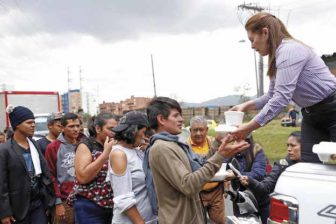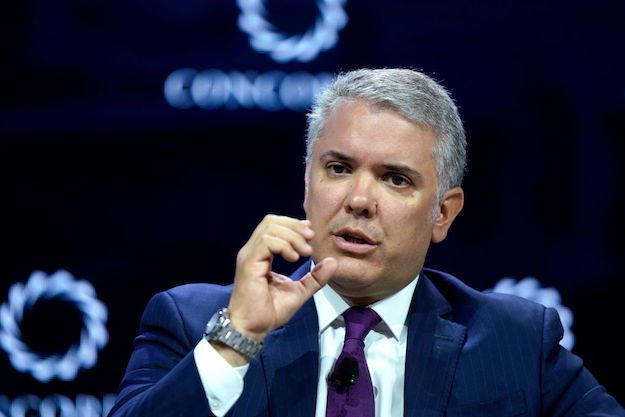Sergio Fajardo, the governor of Antioquia (2012-2015) and former mayor of Medellín (2004-2008) spoke with AQ Online about the role of public-private partnerships in his administration, his views on the peace process in Colombia and his opinion on the role of the middle class in Colombia and Latin America. AQ Online interviewed the governor while in New York City for the conference “Overcoming obstacles in Latin America” organized by the Latin American Student Association of the School of International and Public Affairs (SIPA) at Columbia University.
Interview by Andreina Seijas.
Americas Quarterly Online: What are your expectations for the peace process with the FARC?
Sergio Fajardo: First, I support the peace talks. This would be the third negotiation with the FARC witnessed by my generation. If this one doesn’t work, I don’t think we will be able to witness another one.
Second, I believe that giving ourselves the opportunity to live in peace is an obligation we have in Colombia. My children were born amid violence. We deserve peace and it is the responsibility of our government to find it. If we achieve peace with the FARC it will be a great relief. We still have many problems, but it would be a great step forward. There are mistakes we can’t make again. We cannot clear an area of the country without a serious and solid agreement. I believe the time to negotiate is when your opponent has put down its weapons.
The way in which agreements have been unfolding seems correct, but let’s see what happens. Naturally in Colombia we have great expectations and little fear. But we also have a history of frustration in achieving peace and are aware that the FARC is still the same. This raises the question of if the FARC will be able to leave violence and become a political force with which we can dialogue.
I think it is possible [to achieve peace]. But this will be a very complex negotiation. After 50 years of conflict there are many aspects that must be addressed. Negotiating and then implementing [a peace deal] is a very difficult task, but we deserve it and we need it.
AQ: From your experience as mayor of Medellín and governor of Antioquia, how can the public and private sectors collaborate in topics such as violence reduction?
Fajardo: Although people have very good intentions, projects won’t work outside a political framework. Those who work in politics are who lead and have the capacity to draw up a strategy on how to deal with violence and poverty reduction. The involvement of civil society and the private sector will come when there’s trust in those who govern and transparent leadership in terms of resources and policies.
Despite their good intentions, the impact of the private sector will always be limited. Political leadership is necessary to bring together various sectors for a common nationwide direction. That is how to leverage the individual efforts of the business community.
This is how we have made important progress in Medellín and Antioquia. Rather than businesspeople pretending to do politics in lieu of the government, the private sector is working with the government to make projects happen.
AQ: What is an example of a business or sector that has had an important role in your administration?
Fajardo: Many companies have provided support to develop education infrastructure and scholarship programs. We have said “the most beautiful for the most needy” and have built top-rate learning environments because the first step in education is having a dignified space in which to learn. This should not be a luxury for only those with more resources. Most companies also have told us “there is no need to recognize our work “because they don’t see their support as a tool for promotion but as a way to collaborate with society.
AQ:In terms of security, how has the private sector collaborated in violence reduction?
Fajardo: Every company has an internal security system, and some of them are linked to the security networks of the police, but improving security is not a business issue. Businesses can help and collaborate to some extent, but this is a government issue and one can’t replace the government with good intentions.
We [the government] need good police and a judicial system that works and is transparent and not corrupt. A good way to collaborate is by avoiding any temptation of corruption. I do not tell businesses to “come and give us something.” The state has its resources because taxes are managed transparently.
There will always be aspects of society that receive private support, but the real transformation is in the hands of the government.
AQ: What is the future for the middle class in Colombia?
Fajardo: If not the first, Colombia is the second most unequal country in Latin America. And where inequality is so deep, the middle class is very small.
I believe Colombia’s transformation will be a result of the growth of the middle class. We still have a lot to accomplish, but I have no doubt that the growth of the middle class is linked to better education. The only possibility for the many people living in poverty is access to an education that allows them to climb the ladder and help to build a middle class.
Colombia, like the rest of Latin America, has not invested in education, which is the most important tool for growing the middle class.







